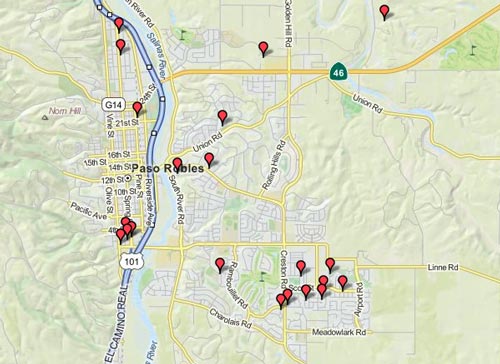Council eases sex offender residency restrictions

A map of registered sex offenders in Paso Robles provided by City-Data.com.
– The Paso Robles City Council voted Tuesday night to ease the city’s sex offender residency restrictions to keep them in-line with recent court decisions.
In the last two years, courts have issued a number of decisions regarding the regulation of sex offenders by local agencies and municipalities. In January 2014, in People v. Nguyen, a California Court of Appeal held that the California Legislature had established a comprehensive scheme for regulating the daily lives of sex offenders thereby limiting local legislation restricting sex offenders except where such legislation is expressly permitted.
In March 2015, the California Supreme Court held that a blanket 2,000 foot residency restriction imposed on sex offenders in San Diego County was unconstitutional, as applied in San Diego County because the restrictions essentially meant they could not live anywhere in the county.
At least one city in San Luis Obispo County has been sued in recent months in connection with its residency restrictions. Many more cities throughout California have received letters threatening suit from sex offender advocacy groups.
City staff, in conjunction with the city attorney’s office, has carefully reviewed the city’s ordinance and the maps showing the protected locations with the city. In light of the recent changes in the law, the following changes to Chapter 9.46 of the City’s Municipal Code are necessary to ensure that it is in compliance with the law:
• Reduce the distance from protected locations at which sex offenders who have committed offenses against children may reside from 1/4 mile to 1/8 mile.
• Remove churches, parks and playgrounds, youth-oriented facilities, and public libraries from the list of protected locations.
• Establish an exception for any sex offender residing at a licensed patient care facility, licensed alcohol and drug treatment facility, licensed mental health facility, or other fully licensed and state-sanctioned rehabilitation facility.





















